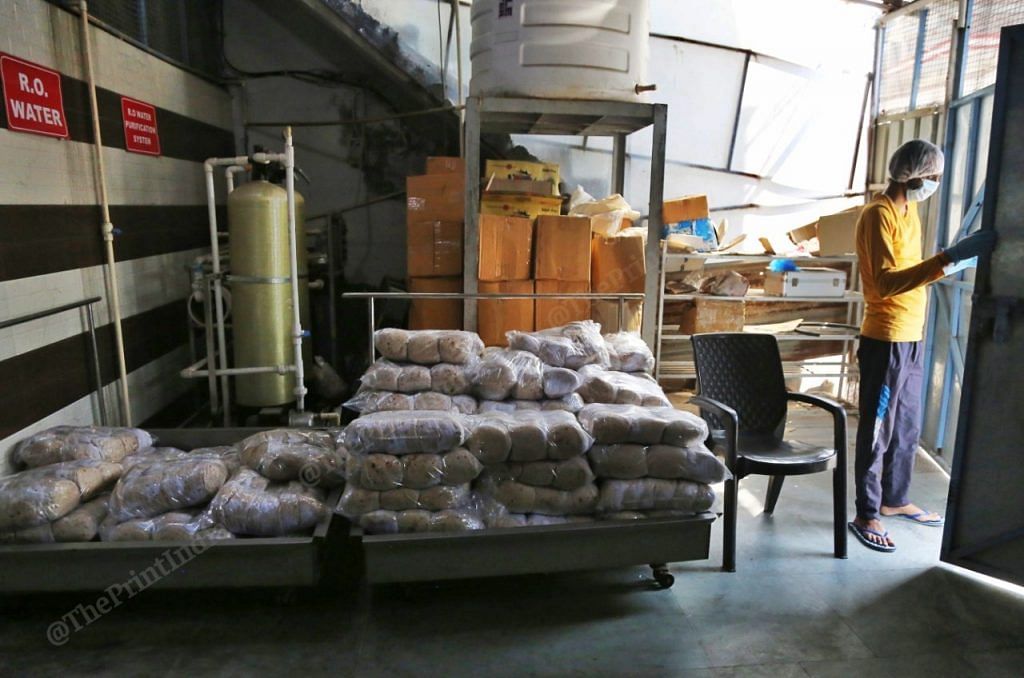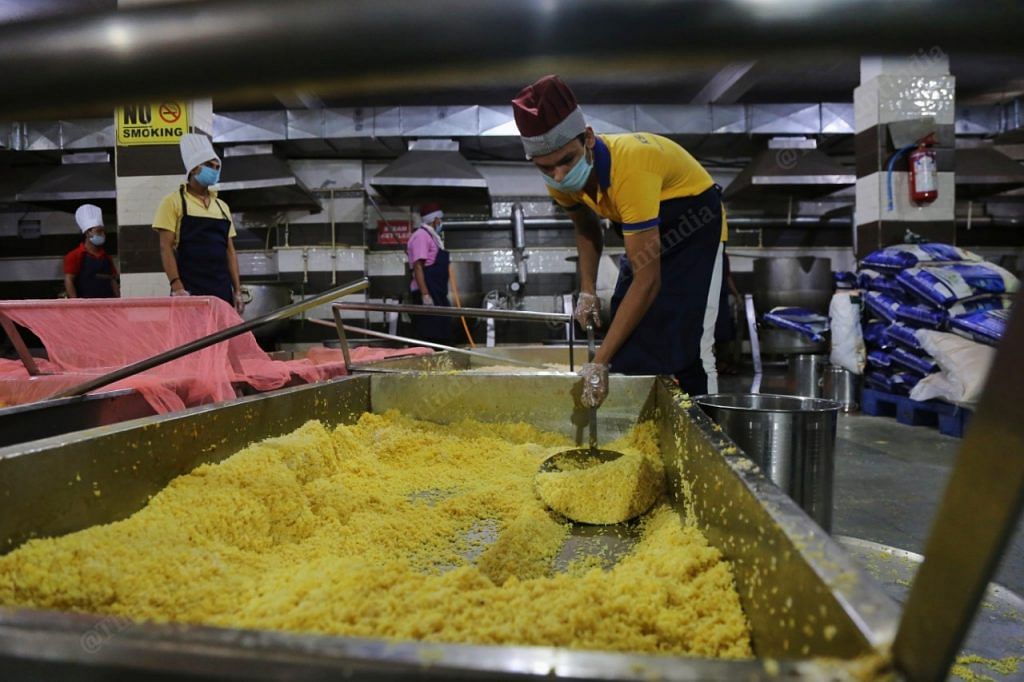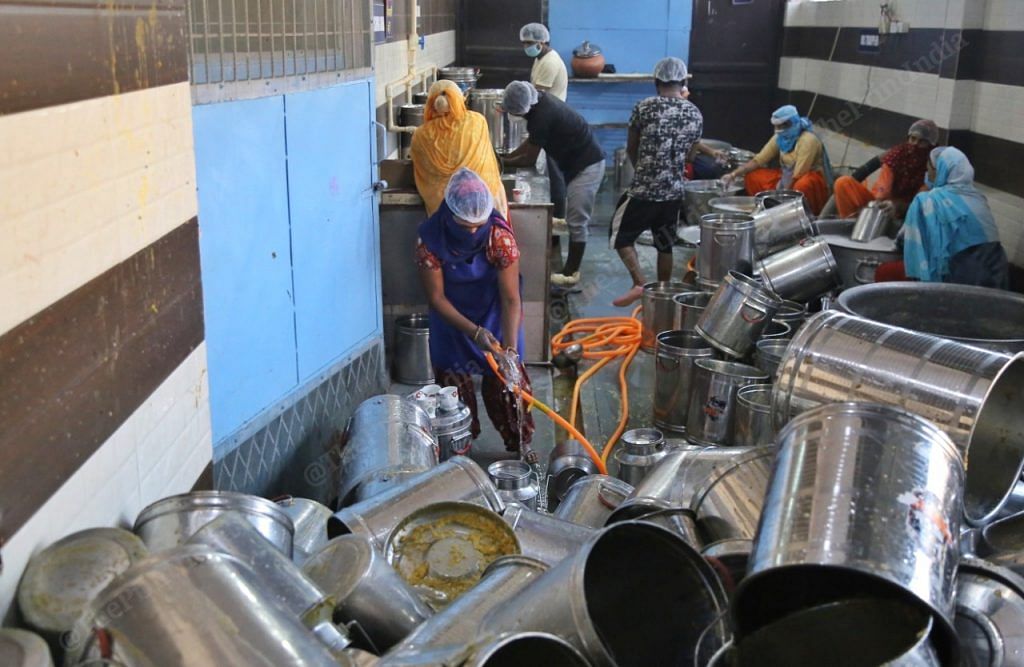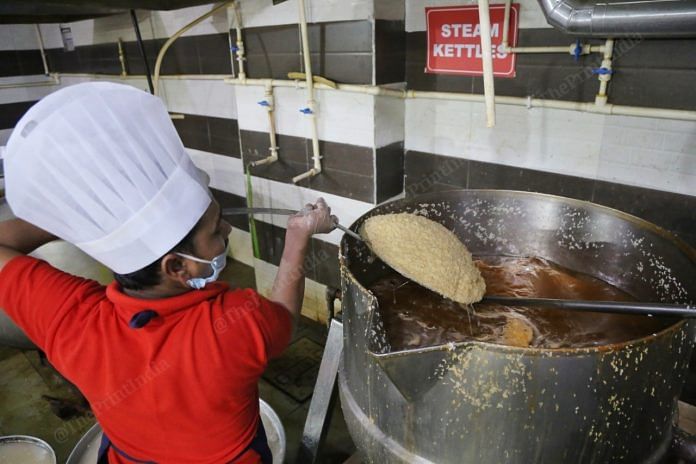New Delhi: At the end of a narrow, winding road in Delhi’s Fatehpur Beri stands a lone godown. Correction: It was a godown, but now functions as a public food shelter run by the People’s Welfare Society that has been operational since 29 March to feed homeless people and migrant workers across South Delhi during the Covid-19 lockdown. The society is an NGO, and, prior to the lockdown, used to make midday meals for schools in the national capital.
The People’s Welfare Society, along with two other food shelters, in Sangam Vihar and Kapashera, is being funded by the Delhi government to make food for distribution in government schools and camps across the capital’s south district. The three kitchens combined prepare food for approximately 80 locations, with the Fatehpur Beri kitchen alone churning out close to 70,000 meals a day, says South Delhi Additional District Magistrate (ADM) Arun Gupta. The other two kitchens, he adds, prepare roughly 40,000-50,000 meals a day,
With more than 10 huge boilers, several large frying pans, and a staff of approximately 100 workers split across two shifts, this kitchen is a study in how to maximise efficiency.
The kitchen in-charge, Jitender Kumar, tells ThePrint that the morning shift, which begins at 4 am and continues until 9-10 am, prepares lunch, while the afternoon shift, which makes dinner, begins at 3 pm and goes on until 6 pm. “We only serve freshly-prepared, warm meals,” Kumar says.
Each shift has approximately 50 staff members with 20 people on the cooking team, 15 as the washing staff, four in charge of sanitising the entire area, and the rest responsible for transporting the food.

Also read: Covid-19 has given developing countries a great chance to care for their migrant workers
What’s for lunch?
A typical menu for the day, Kumar says, might include chana dal, khichdi, chapati, vegetables (potatoes, lauki) and rajma. Once a week, even dessert is served — usually halwa or kheer. Kumar explains that one person gets three rotis and 120 grams of dal.
Babulal, who heads the cooking, clocks in at 4 in the morning and only leaves the kitchen at 5 pm. “Whatever be the order, we will cook it. It’s no problem,” he says, before rattling off the list of dishes he has recently cooked — kadhi, chhole, rice, rajma, porridge, pulao, soya bean, peas, etc. When asked what his favourite thing to cook is, he responds, “It isn’t about what I enjoy making. What matters is what people want and the orders that come.”

Also read: World awaits Alphonsos, but the mangoes are stuck in Konkan lockdown
Hygiene and social distancing in the kitchen
Of course, given the pandemic, it’s not just getting food that’s a concern, but the hygiene standards of those who make it. Kumar and his staff supervisor, Brijmohan, have an elaborate system in place to ensure that high standards of safety and sanitation are maintained.
Brijmohan shows ThePrint how, in the kitchen, not more than 15 people are allowed at one time, in deference to the social-distancing guidelines in place to check the spread of coronavirus/ The washing staff has a designated area with a separate entrance, so that none of the dirty utensils is in the same vicinity as the food prepared. Mamta, who heads the dishwashing team, tells ThePrint that, in a day, both the shifts clean nearly 1,200 utensils.
Kumar further underscores that the kitchen is sanitised four times a day, while regular cleaning takes place the entire day as the food is prepared. He says, “We maintain all norms of social distancing and check the temperature of all our staff daily. Then they sanitise their hands and wear caps, gloves and aprons. And only then are they allowed inside.”

Also read: Swiggy could shut many of its cloud kitchens, lay off over 500 workers as sales slump
Rations and budgeting
To cook 70,000 meals a day requires regular supplies and the public food shelter has a procurement team in place to do the needful. Kumar says that, once a week, flour and rice are procured from a wholesale market — Naya Bazaar, near Delhi’s Sadar Bazaar. And vegetables are procured every day from the Keshavpur Mandi, near Paschim Vihar.
“There are no fixed proportions, it all depends on the orders we get,” he says.
South Delhi ADM Arun Gupta says the funds for the food comes from the AAP government in Delhi. According to him, the budget to operate the three kitchens so far would have come to a total of around Rs 5 crore, of which half would be for the shelter at Fatehpur Beri.
“The food from these shelters is distributed across Chhatarpur, Mehrauli, Ambedkar Nagar, Malviya Nagar and Deoli,” says Gupta. Each location has three officers to monitor the entire process. One is a Delhi government official (usually a section officer), while the other two officers are civil defence volunteers. Gupta adds that the points for food distribution were decided after close consultation with MLAs. “This system has benefitted many people. Right from the cooking of food to its distribution, it is a very smooth system.”
Also read: My lord, migrant labourers need more than just food, just like we all do




It’s heartening to know the Delhi govt is feeding the poor.
Why can’t we have such kitchens permanently serving clean and cheap food? Street vendors are highly unreliable for hygiene.
Good job team, but see to it that once lockdown is over, the street beggars are provided some permanent jobs and shelters
When reading this one needs to ask the govt many questions ,,,, if so much funds available from PM, s disaster fund,,,, PM cares etc etc,,,,, Then why do NGO, s need to be doing such heroic feeds,,, indeed a shamus on a leader who talks big as how Corona has changes people, ,,,,, no it has and will not change our politicians,,,,, have we heard of a single politician or their children doing yeoman services at this crucial time,,,,, no they are scared of their own lives
When reading this one needs to ask the govt many questions ,,,, if so much funds available from PM, s disaster fund,,,, PM cares etc etc,,,,, Then why do NGO, s need to be doing such heroic feeds,,, indeed a shamus on a leader who talks big as how Corona has changes people, ,,,,, no it has and will not change our politicians,,,,, have we heard of a single politician or their children doing yeoman services at this crucial time,,,,, no becausevthey are scared of their own lives
Do not give chance to stri shakti kitchen to serve as becoz they are tax evaders and ration seller to local vendors.